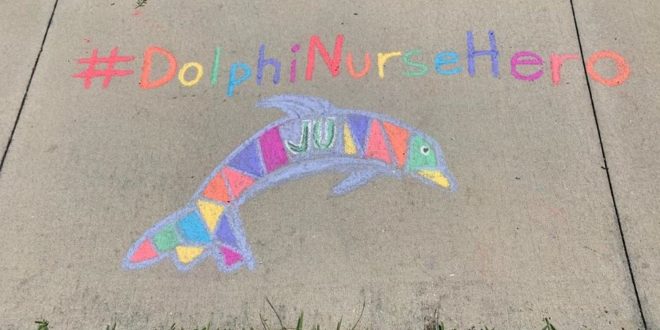In the midst of current adversity, the Jacksonville University nursing community banded together to engage in initiatives to uplift and aid their colleagues, who are treating victims of the COVID-19 virus.
The idea evolved from Clinical Assistant Professor of Nursing Melissa McRae’s post on her Facebook page about being a drop off site for donated supplies and sewn masks in the Nocatee neighborhood group. After seeing the post, some members of the Keigwin School of Nursing faculty decided that this would be a great way to serve local nurses.
Since then, McRae and Amber Santos, Clinical Assistant Professor of Nursing, expanded the idea to encourage the campus community to participate in other activities to ensure nurses on the front lines of responding to the COVID-19 crisis are safe and respected during these turbulent times.
“We’re still organizing everything, but we had a passion for this and so did our alumni and students,” said Santos. “Nursing students, alumni and faculty had such an interest in helping that we decided to create a separate JU Nursing Facebook page that would be public.”
The public JU Nursing page seeks to connect faculty, students, alumni, or Jacksonville residents who are interested in assisting however they can.
“It’s about more than getting supplies,” said Santos “We also want to be an advocate for nurses through contacting local representatives to demand proper protections for healthcare workers and we’re working on developing some ideas to boost our alumni morale to let them know their JU family care.”
“This is for the long haul,” said Santos “This virus will be going on for a while, and we need to make sure that we gather as much supplies as possible by using Facebook.”
For now, due to a low supply of masks nationwide, many are volunteering to sew masks, including University First Lady Stephanie Cost.
“Mrs. Cost has also been prolific with sewing masks and has made 160 so far to support nurses,” said Santos “We have managed to create a good system so far with just our four faculty members and Mrs. Cost, but we would love for other faculty and staff members outside of our department to get involved” said McRae
Clinical Nursing Professor Jennifer Willison, retired professor Dian Renfro, and Director of Graduate Nursing programs Hilary Morgan have been sewing masks to donate to hospitals, nursing homes, and alumni.
The group recently provided 230 handsewn masks to Baptist Hospital as coordinated by Professor Leyla Pordeli.
Santos and McRae hope other JU staff and faculty will participate in donating supplies and advocate for nurses as well.
“If anyone has supplies laying around, whether it’s mask or gloves, we could set up some type of drop off schedule to get them to nurses in need,” said McRae.
McRae and Santos plan to help as many Dolphin alumni nurses as possible since many of them work in the local Jacksonville hospitals.
“We look forward to the Facebook pages becoming more expansive in the coming days and faculty and alumni becoming more involved,” said Santos.
Though nursing students are unable to meet in person, they have been making the best of the situation by remaining connected online as well as by phone.
“Our current students are more connected to us now more than ever before,” said Santos. “Students have been reaching out to me for meaningful interactions outside of class and asking how they can help or just checking in about how to move forward.”
McRae and Santos stated that COVID-19 will change how the Nursing Department progresses in terms of safety and flexibility, but they are grateful that the program managed to successfully adapt.
“So far, students have been giving me very positive feedback about online learning,” said McRae. “From the time we got the message that in-person learning would be canceled, we just had a matter of days to change how we deliver education but faculty have done an amazing job with the conversion.”
Santos and McRae agreed that the pandemic has shown many nursing students the importance of their future profession.
“This time is allowing students to refocus on the basics as well as preparation for future viruses and health concerns,” said Santos. “We’ve resorted to more creative alternative methods to learning, but we have all managed to remain pretty positive.”
By Christina Sumpter
 Wave Magazine Online Jacksonville University News Hub
Wave Magazine Online Jacksonville University News Hub
